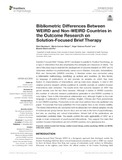Mostrar el registro sencillo del ítem
Bibliometric differences between WEIRD and non-WEIRD countries in the outcome research on Solution-Focused Brief Therapy
| dc.creator | Beyebach, Mark | es_ES |
| dc.creator | Neipp López, María del Carmen | es_ES |
| dc.creator | Solanes-Puchol, Ángel | es_ES |
| dc.creator | Martín-del-Río, Beatriz | es_ES |
| dc.date.accessioned | 2022-04-07T07:47:45Z | |
| dc.date.available | 2022-04-07T07:47:45Z | |
| dc.date.issued | 2021 | |
| dc.identifier.issn | 1664-1078 | |
| dc.identifier.uri | https://hdl.handle.net/2454/42676 | |
| dc.description.abstract | Solution Focused Brief Therapy (SFBT) developed in parallel to Positive Psychology, as a type of intervention that also emphasizes the strengths and resources of clients. The aim of this study was to examine the development of outcome research on SFBT and to determine whether it is predominantly carried out in Western, Educated, Industrialized, Rich and Democratic (WEIRD) countries. A literature review was conducted using a bibliometric methodology, identifying: (a) authors and countries, (b) time trends, (c) language of publications; (d) and journals; (e) samples on which they were tested; (f) characteristics of interventions; and (g) main study designs. A total of 365 original outcome research articles published in scientific journals on solution-focused interventions were extracted. The results show that outcome research on SFBT has grown steadily over the last three decades. Although it started in WEIRD countries, the number of outcome research publications generated in non-WEIRD countries is now higher. There is little international collaboration and, although English is the main language of publication in WEIRD countries, English, Chinese and Parsi predominate in non-WEIRD countries. Productivity is low and most authors have only published one paper. The journals that have published the most papers have a very diverse visibility. The tested interventions are conducted both in clinical and non-clinical samples; mostly in individual and group format; face-to-face; and not only in the form of psychotherapy, but also as coaching and school interventions. Almost half of the publications are randomized controlled trials. The results confirm the wide applicability of SFBT as a single or main component of psychosocial interventions. They support the claim that solution-focused interventions are not a WEIRD practice, but a global practice. | en |
| dc.format.extent | 12 p. | |
| dc.format.mimetype | application/pdf | en |
| dc.language.iso | eng | en |
| dc.publisher | Frontiers Media | en |
| dc.relation.ispartof | Frontiers in Psychology, 12:754885 | en |
| dc.rights | © 2021 Beyebach, Neipp, Solanes-Puchol and Martín-del-Río. This is an open-access article distributed under the terms of the Creative Commons Attribution License (CC BY). The use, distribution or reproduction in other forums is permitted, provided the original author(s) and the copyright owner(s) are credited and that the original publication in this journal is cited, in accordance with accepted academic practice. No use, distribution or reproduction is permitted which does not comply with these terms. | es_ES |
| dc.rights.uri | http://creativecommons.org/licenses/by/4.0/ | |
| dc.subject | Bibliometric analysis | en |
| dc.subject | Non-WEIRD | en |
| dc.subject | Positive psychology | en |
| dc.subject | Solution-focused brief therapy | en |
| dc.subject | Solution-focused therapy | en |
| dc.subject | WEIRD | en |
| dc.title | Bibliometric differences between WEIRD and non-WEIRD countries in the outcome research on Solution-Focused Brief Therapy | en |
| dc.type | info:eu-repo/semantics/article | en |
| dc.type | Artículo / Artikulua | es |
| dc.contributor.department | Ciencias de la Salud | es_ES |
| dc.contributor.department | Osasun Zientziak | eu |
| dc.rights.accessRights | info:eu-repo/semantics/openAccess | en |
| dc.rights.accessRights | Acceso abierto / Sarbide irekia | es |
| dc.identifier.doi | 10.3389/fpsyg.2021.754885 | |
| dc.relation.publisherversion | https://doi.org/10.3389/fpsyg.2021.754885 | |
| dc.type.version | info:eu-repo/semantics/publishedVersion | en |
| dc.type.version | Versión publicada / Argitaratu den bertsioa | es |
Ficheros en el ítem
Este ítem aparece en la(s) siguiente(s) colección(ones)
La licencia del ítem se describe como © 2021 Beyebach, Neipp, Solanes-Puchol and Martín-del-Río. This is an open-access article distributed under the terms of the Creative Commons Attribution License (CC BY). The use, distribution or reproduction in other forums is permitted, provided the original author(s) and the copyright owner(s) are credited and that the original publication in this journal is cited, in accordance with accepted academic practice. No use, distribution or reproduction is permitted which does not comply with these terms.



